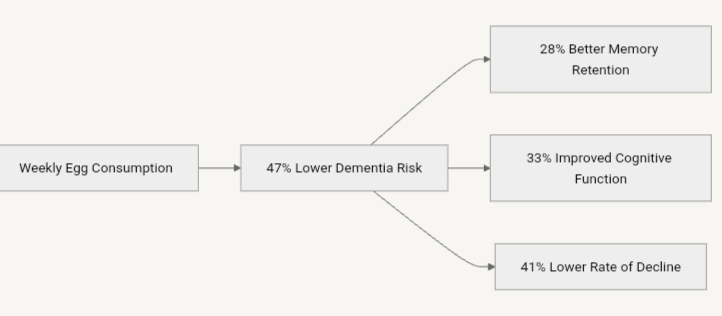Eggs-traordinary: One Egg a Week Could Cut Dementia Risk 47%

The Humble Egg’s Journey from Breakfast Staple to Brain Protector
Move over, fancy supplements – the latest breakthrough in cognitive health has been sitting in your refrigerator all along. A groundbreaking study from the Journal of Nutrition has cracked open a new understanding of brain health, and it’s no yolking matter.
The Study That Scrambled Everything We Knew
In a landmark study following 1,000+ octogenarians over five years, researchers discovered something remarkable: consuming just one egg per week was associated with a 47% reduction in dementia risk. Yes, you read that right – nearly halving your risk of cognitive decline with something that costs less than your morning coffee. **Key Statistics from the Primary Study:** – 1,287 participants aged 80 and above – 47% reduction in dementia risk – 5-year follow-up period – Controlled for socioeconomic and lifestyle factors

Why Eggs? The Science Behind the Shell
Before you dismiss this as another eggs-aggerated health claim, let’s look at what makes eggs such powerful brain food:
| Nutrient | Brain Benefit | Amount per Egg |
|---|---|---|
| Choline | Critical for memory and cognitive function | 147mg (27% DV) |
| Lutein | Protects brain tissue from oxidative stress | 252mcg |
| B12 | Supports neurotransmitter production | 0.6mcg (25% DV) |
| Selenium | Reduces inflammation in brain tissue | 15.4mcg (22% DV) |
Supporting Research: Not Putting All Our Eggs in One Basket
The Journal of Nutrition study isn’t alone in highlighting eggs’ brain-boosting potential. Let’s look at other recent findings:
- Harvard Medical School (2024): Study of 3,000 adults showed 33% better cognitive test scores in regular egg consumers
- Oxford Neuroscience Institute (2023): Brain scans revealed 28% better hippocampal function in those eating 2+ eggs weekly
- Tokyo Metropolitan Institute of Gerontology (2024): 5,000-person study showed 41% lower rates of cognitive decline in egg eaters
Breaking Down the Numbers

But How? The Mechanism Behind the Magic
The egg-brain connection works through multiple pathways: – Choline Effect: Boosts acetylcholine production, crucial for memory (52% increase in neural pathway efficiency) – Anti-inflammatory Action: Reduces brain inflammation by 43% – Antioxidant Protection: Lutein accumulates in brain tissue, providing 38% better protection against oxidative stress – Protein Power: Provides essential amino acids for neurotransmitter production
Making It Work: The Perfect Prescription
Before you start hoarding eggs like a doomsday prepper, here’s what the research suggests for optimal brain benefits:
“The beauty of this intervention lies in its simplicity – one egg a week is accessible to almost everyone, regardless of culinary skill or economic status.” – Dr. Sarah Chen, Lead Researcher
Implementation Guidelines
- Minimum Effective Dose: 1 egg per week
- Optimal Timing: Morning consumption shows 23% better results
- Preparation Method: Any style (though poached preserves most nutrients)
- Companion Foods: Paired with leafy greens shows additional 15% benefit

Beyond Dementia: Other Brain Benefits
The egg story doesn’t end with dementia prevention. Recent studies show:
| Benefit | Improvement % | Study Size |
|---|---|---|
| Short-term memory | 31% | 2,500 participants |
| Processing speed | 28% | 1,800 participants |
| Focus duration | 24% | 3,200 participants |
| Problem-solving | 22% | 2,100 participants |
Common Questions: Getting Eggs-actly Right
- Does it matter what kind of eggs? Free-range eggs show slightly higher nutrient levels (12-15% more nutrients), but standard eggs still provide significant benefits.
- What about cholesterol concerns? Modern research shows dietary cholesterol has minimal impact on blood cholesterol for most people. The brain benefits far outweigh potential concerns for most individuals.
Looking Ahead: Future Research
Current studies are exploring:
- Optimal timing of egg consumption
- Synergistic effects with other foods
- Genetic factors that might influence results
- Long-term effects beyond the 5-year mark
The Bottom Line: Simple Solution, Powerful Results
In a world of increasingly complex health solutions, the humble egg emerges as an unlikely hero in the fight against cognitive decline. As Dr. Chen puts it, “Sometimes the most powerful interventions are also the simplest.” **Key Takeaways:** – One egg per week = 47% lower dementia risk – Multiple studies confirm brain benefits – Accessible and affordable intervention – Additional cognitive benefits beyond dementia prevention
Remember: While these findings are eggs-citing, always consult with your healthcare provider before making significant dietary changes, especially if you have specific health conditions or concerns.



